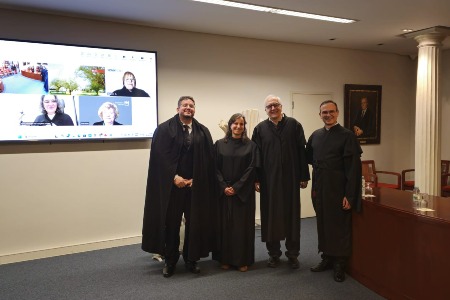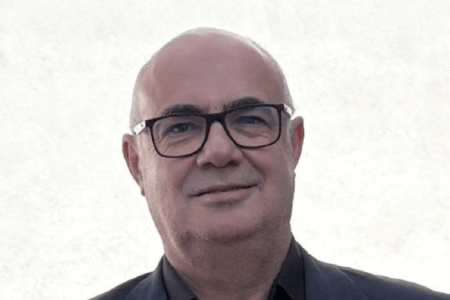Candidate:
Ivone Manuela Neiva Santos
Date, Time and Location:
29 January 2026, 14:30, Sala de Atos da Faculdade de Engenharia da Universidade do Porto
President of the Jury:
António Fernando Vasconcelos Cunha Castro Coelho (PhD), Associate Professor with Habilitation from Faculdade de Engenharia, Universidade do Porto
Members:
Marisa Rodrigues Pinto Torres da Silva (PhD), Full Professor, Faculdade de Ciências Sociais e Humanas, Universidade Nova de Lisboa;
Maria Madalena da Costa Oliveira (PhD), Associate Professor, Instituto de Ciências Sociais, Universidade do Minho;
Maria José Lisboa Brites de Azeredo (PhD), Associate Professor with Habilitation, Faculdade de Comunicação, Arquitetura, Artes e Tecnologias da Informação, Universidade Lusófona;
Ana Isabel Crispim Mendes Reis (PhD), Associate Professor, Department of Communication and Information Sciences, Faculdade de Letras, Universidade do Porto (Supervisor);
Ricardo José Pinheiro Fernandes Morais (PhD), Assistant Professor, Department of Communication and Information Sciences, Faculdade de Letras, Universidade do Porto.
The thesis was co-supervised by José Manuel Pereira Azevedo (PhD), Full Professor, Department of Communication and Information Sciences, Faculdade de Letras, Universidade do Porto.
Abstract:
Empathy, which is defined as the ability to understand and share the emotional state of others, is considered to be fundamental to both personal well-being and social cohesion. Its presence has been linked to pro-social behaviour, while its absence has been associated with a greater predisposition to aggressive behaviour. Empathy is a multidimensional construct integrating affective and cognitive components, and educational interventions appear to positively influence its development. While cognitive empathy is generally considered to be more sensitive to education, the affective component appears to benefit from emotional activities. Empathy is now considered a vital skill for the ‘digital citizen’, but research suggests that empathy displayed online is lower than empathy displayed offline. Tendencies such as inattention, desensitisation and disinhibition, which are stimulated by the internet, seem to make empathy more difficult to achieve. The fact that empathic capacity primarily develops towards the end of adolescence highlights the importance of exploring strategies to foster it throughout education, particularly in an era where digital technology is becoming increasingly prevalent in all areas of social life. This scenario highlights the need to deepen our understanding of digital empathy and consider strategies for promoting it in education. This is reflected in the objectives that guided this thesis. The research underlying this thesis includes a review of the literature on empathy and the methodologies employed to study and encourage it. It features a critical analysis of the role of screens in young people’s daily lives, as well as of the different approaches to the relationship between empathy and digital technology. Given that sound is a privileged vehicle for emotional connection with characteristics that make it resilient to digital environments, the review also explores the literature on the potential of auditory stimuli and audio narratives to promote empathy. Supported by this review, the empirical research comprises two studies: a descriptive study and a quasi-experimental study. These studies involved three educational institutions at different levels and students in the adolescent age group (10–24 years). A total of 279 students participated in the descriptive study and 228 in the quasi-experimental study, of whom 76 were in the experimental group. The descriptive study measured and compared participants’ empathy and digital empathy using a questionnaire based on self-report scales previously used in empathy research with this age group. The quasi-experimental study assessed the impact of an educational programme designed to explore the potential of sound and narrative. Based on the experience-based learning model, the programme combined technical and socio-emotional learning through Media Education. It is organised into two modules. The first module consists of a set of group dynamics exploring the theme of empathy and its relationship with digital environments and auditory stimuli. The second module considers the process of producing audio narratives with emotional content. The intervention’s impact was assessed both quantitatively, via pre- and post-test surveys, and qualitatively, through analysis of the narratives and other texts produced by participants throughout the programme. Overall, the results of the descriptive study indicate that digital empathy is lower than general empathy, with the affective component being lower than the cognitive component on both scales. The results also show that girls have higher levels of both empathy and digital empathy. Age appears to be a differentiating factor in empathy levels, but not in digital empathy. Results suggest that digital empathy does not increase significantly during adolescence, unlike general empathy. These results therefore support the need for educational interventions to stimulate empathy from early adolescence onwards addressing its multidimensionality and various contexts. The quantitative impact of participation in the educational programme evaluated in the quasi-experimental study was not significant. Nevertheless, a qualitative analysis of the data suggests that participation in the programme provided an opportunity to experiment with different empathic practices. The programme can therefore be considered a tool that facilitates the reconciliation of technical learning with the development of empathy. This tool can be applied to different stages of adolescence, levels of education, and school contexts.
The findings of this research reiterate the concerns expressed in existing literature about the impact of digital environments on empathy development among young people. The
findings suggest that programmes based on producing audio narratives with emotional content could promote empathy in educational contexts, addressing the constraints imposed by digital environments. Based on these findings, this research has produced a manual to disseminate the tested educational model and a validated instrument to measure empathy and digital empathy in Portuguese. To our knowledge, this is the first questionnaire of its kind to enhance sound stimuli.
Keywords: digital empathy; audio production; narrative; education.








